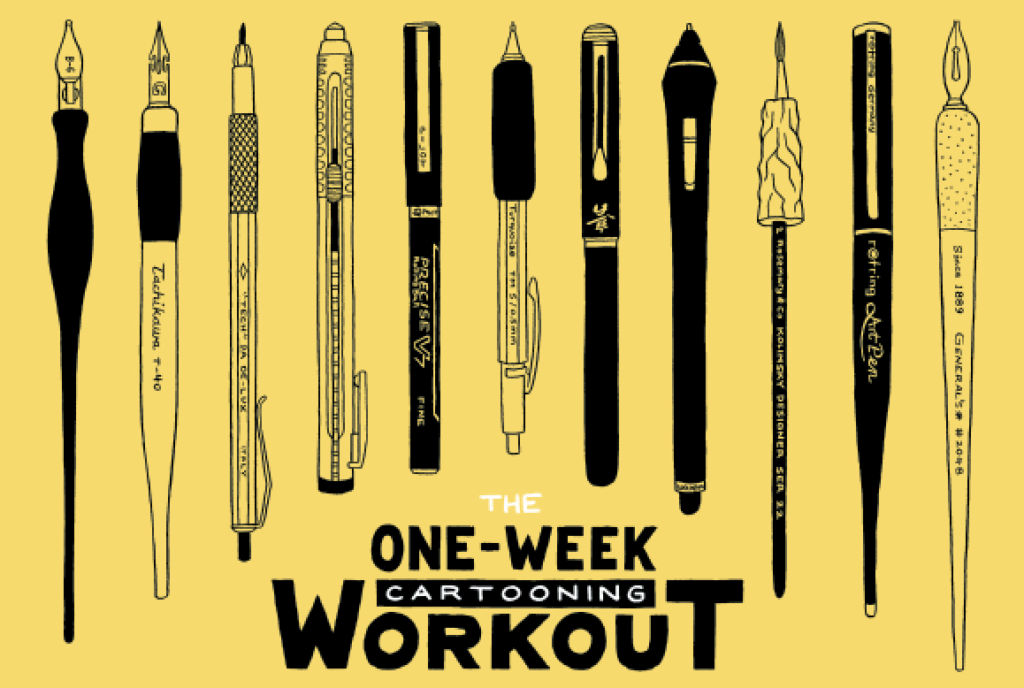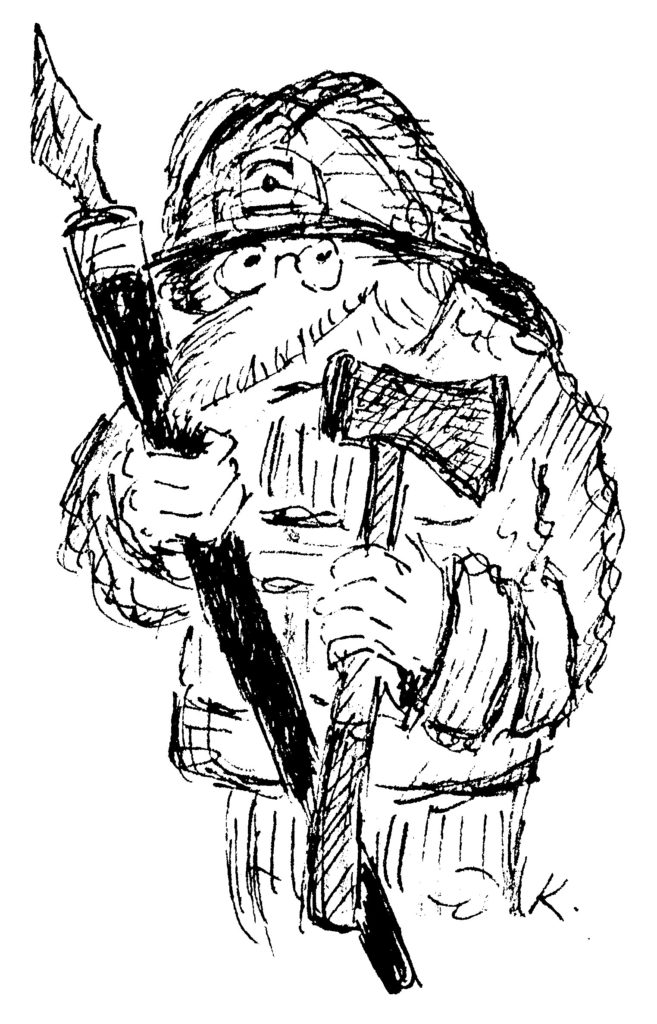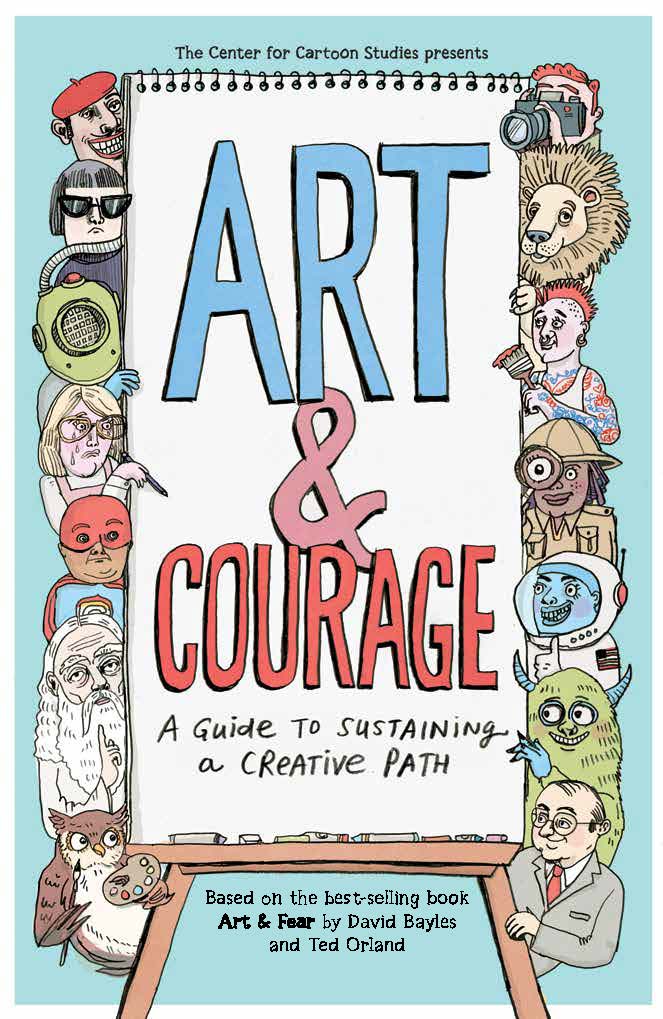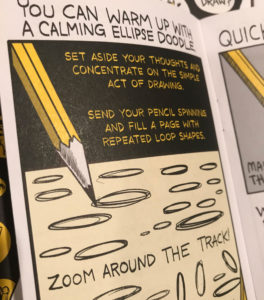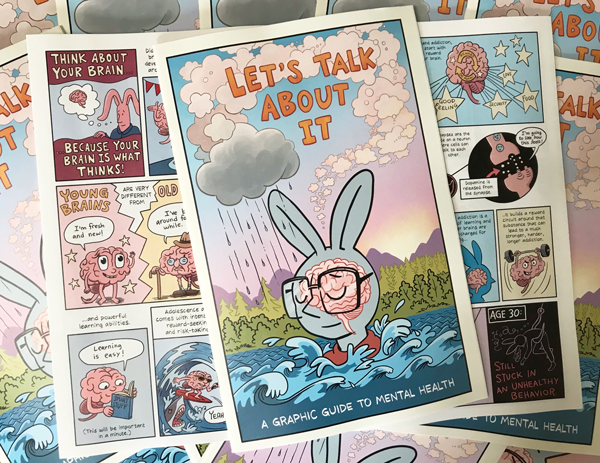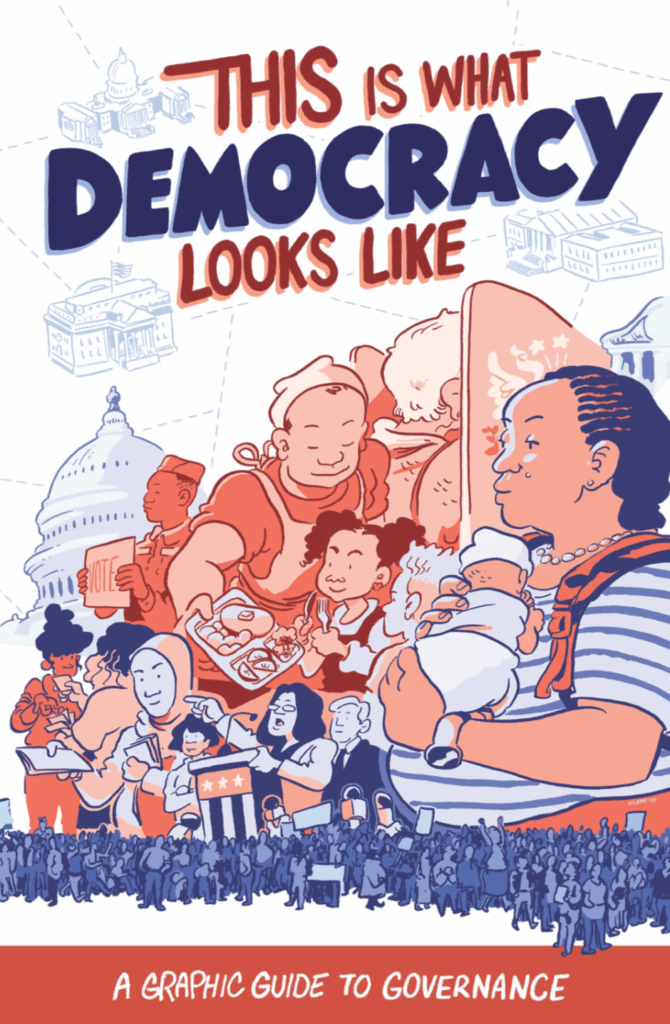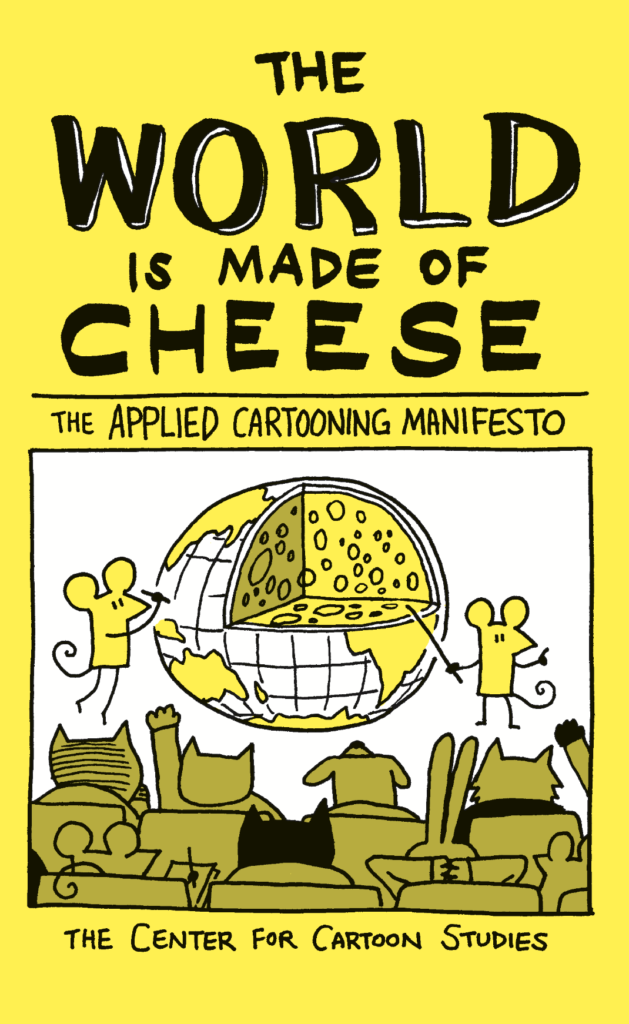
An Element of Recovery
An Exit Interview with Sam Nakahira, MFA ‘21, and James Sturm
You make comics about things that interest you: overlooked histories, dreams, mythology, Marxism, and more. Can you tell me about one or two of the comics that make up your senior thesis project and what attracted you specifically to those subjects?
My thesis, Redefinition, is an anthology of short nonfiction comics, each one exploring overlooked histories. I wanted to use this year to think more critically about and transform my understanding of how US imperialism and racial capitalism structure our world. I spent a good part of the year creating a comic about American consumption of K-pop. I became interested in studying American imperialism in Korea after I became a big K-pop and BTS fan about two years or so ago. While learning about the Korean War, I soon realized that most Americans consume K-pop without understanding the US role in the division of Korea and the creation of the South Korean state.The comic was a reflection on the unseeing Western gaze, how Americans often ignore the impact of US colonization on the world.
Another comic I worked on was about wakashu, the third gender of Edo Japan. I like to explore histories about how people organized their lives and sense of self in non-Western countries before Western colonization erased their traditions and way of life. I think there’s also an element of recovery to my work, a desire to bring marginalized histories to the center.
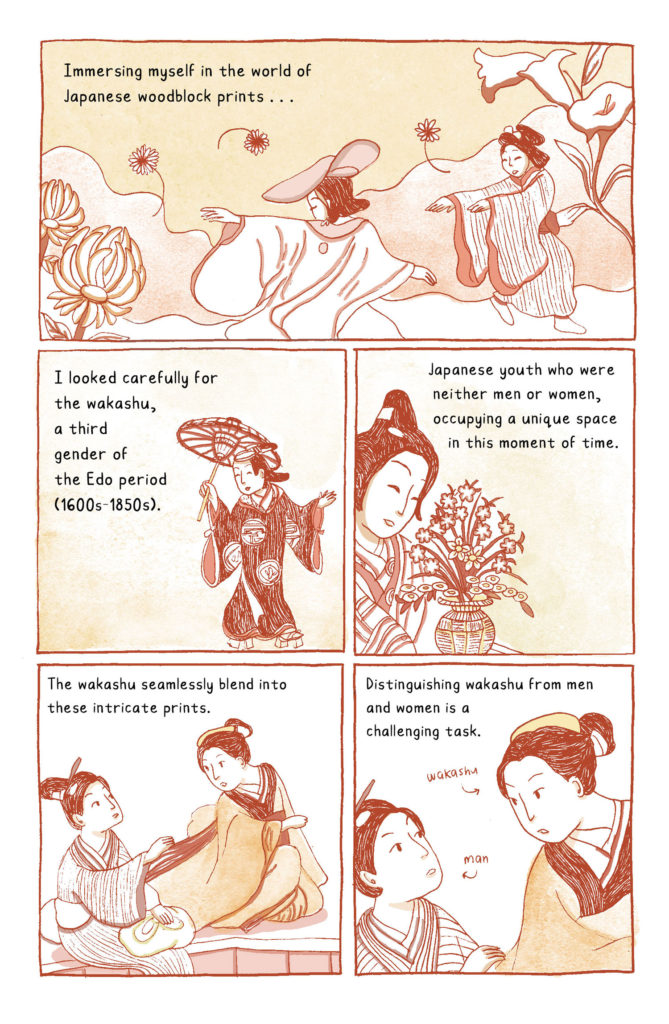
Your work blends aspects of journalism, advocacy, and creative writing into a very spare and poetic sensibility. Does that sound like a good description of your work?
Yes, that’s a great description. I take different approaches to making comics, and I’m still trying to figure out a good balance between them all. My approach often depends on the subject matter and what I’m trying to convey in a particular comic. I’d like to work more in fiction someday, but as of recently, I feel a lot more motivated to work on nonfiction comics. I spend a lot of time thinking about Grace Lee Boggs’s idea of visionary organizing, artists creating work that allow us to reimagine ourselves outside of capitalism. And often, I feel like working in creative nonfiction is more effective in that pursuit.
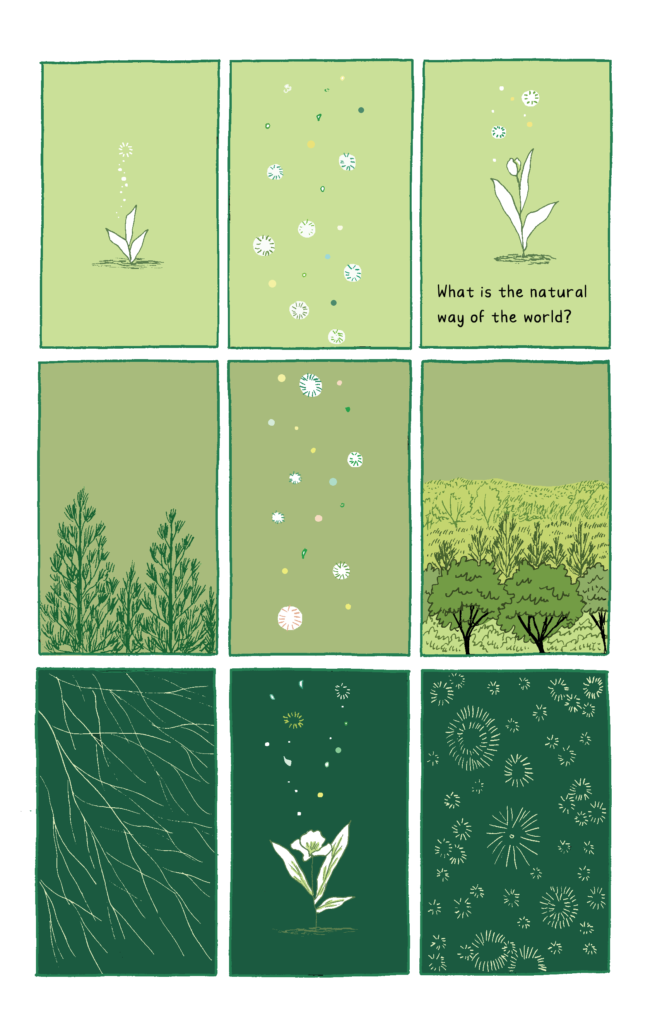
Whose work has influenced and shaped your approach to making comics?
My approach to comics has been shaped by a lot of the cartoonists who graduated before me at The Center for Cartoon Studies (CCS): Dan Nott, Leise Hook, and Issy Manley. I find Issy’s comics to be so thoughtful and engaging; I love the way she takes readers on an exploratory journey of her thoughts about an issue in her comics. I especially admire Dan and Leise’s evocative visual metaphors and symbolic imagery to convey difficult, complex issues. When I first read Dan’s comics and looked at his innovative drawings, I felt this sense of excitement, like I never imagined that people are able to convey and communicate ideas in this way. Most nonfiction comics and comics journalism that I’ve read tend to use somewhat mundane, literal imagery to convey their writing–probably because it’s so hard to draw and represent ideas in a visually stunning but accurate and respectful manner. With my nonfiction comics, I tend to focus more on the writing, but lately, I’ve also been trying to think more visually, too.
You worked with Dan Nott as a thesis advisor. What was that like?
It was so amazing! I’m so grateful for all his help and support—I appreciate his dedication to mentorship, as I know he was super busy teaching at CCS and working on his book this past year. He provided a lot of editorial feedback and close readings of my many drafts. I don’t think I’ve ever gone through so many drafts for my comics like this year. There was a lot of restructuring and reworking the text and drawings, and Dan always carried the same editorial energy into carefully reading my numerous drafts. I also admired how he would come up with questions and insights into the drafts that made me think more deeply about the subject matter of the comic. Dan also explained a lot of his process to me and gave me various exercises to work out different parts of my comics. This past year, I was his teacher’s assistant for Survey of the Drawn Story, so during our thesis meetings, we also talked a lot about class material and comics and cartoonists in general, which also helped me broaden my perspective of the field. I feel so lucky to have him as a thesis advisor and to have learned so much from him about comics and creating them.
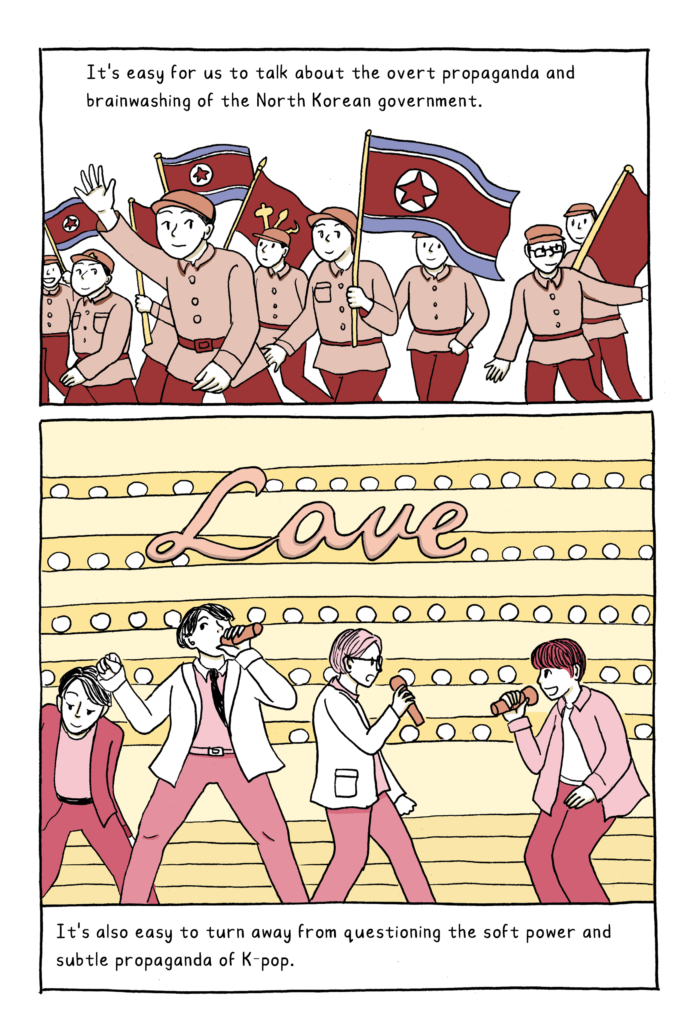
It sounds like CCS has profoundly influenced the way you approach cartooning.
Yes, in so many ways! Before coming to CCS, I think I was creating more of illustrated text rather than comics, not truly understanding the medium. I’ve learned a lot from my classmates and teachers, and I think the CCS community’s excitement for comics and zines has helped me appreciate the craft of making comics and valuing how cartoonists create interesting, effective connections and symbiosis between drawings and words. I also feel grateful for the CCS Schulz Library; being able to read the work from different artists has also broadened my understanding of comics and what is possible with the field.
You worked with me and a team of Harvard students on the healthcare system comic. What was that like for you? What did you learn about healthcare and working on that comic book?
Such an incredible experience, I loved collaborating with you and the team for various parts of the project and seeing the different perspectives that each person brought to the comic. I enjoyed creating short comics and drafts with non-cartoonists, Harvard medical students, and I learned a lot from them. As a nonfiction cartoonist, I also admired and found it educational to see your comics-making process, how you structured the comic about such a complex topic and from reading the different drafts leading up to the final comic.
Before the project, I always felt confused and over my head when trying to understand the US healthcare system, so I appreciate getting the chance to take the time to study, research, and grapple with its complexities with a group of people. I knew the system had many flaws, but I didn’t realize the extent of it: thinking about the many ways in which hospitals and private companies are able to maximize profit from healthcare, like the billing system, really shook me. Overall, this project has made me feel more strongly about how we need more change and accessible information about our healthcare system. I also enjoyed learning about how the Civil Rights Movement played a huge role in legalising Medicare and moving Americans towards the concept of universal healthcare. I feel like our history books need to better communicate these histories and the expanse of the Civil Rights Movement.
How did the collaborative nature of that project differ from your own practice?
The project was different from my own comics-making, since like most creators, I work independently on the story and drawings for comics. I like to have others read my drafts, so I can see what’s working and not for readers. But other than that, there’s not so much of a collaborative element. I think it takes different skills to work on a team and figure out the narrative and images of a comic together. Everyone had an area of the comic to focus on, but James really tied everything together into one cohesive draft. And Kazimir Lee’s drawings added a lot of meaning to the comic, too.
For this project, it was different in that I spent a lot more time thinking about how to write and draw for an audience. I’m not sure if it’s instinctual, but oftentimes, my personal feelings come out when I make comics. My comics are not completely journalistic since I incorporate my own opinions when writing. But for this comic, I learned the value in taking a more neutral approach to communicating information, to draw more people into reading the comic. I also would not have thought to create animals in the style of Richard Scarry to engage readers and make the subject matter more approachable.
What attracted you to this project?
I was excited to work on this project as I found it so compelling and inspiring; with the pandemic, it’s easy to see that the healthcare system in America has long been broken and needs change. And most Americans don’t understand their insurance plans nor how exactly private industries take advantage of people. I thought it would be cool to contribute to a public education project that uses comics to convey information about a complex topic.
Tags: CCS Alum, history comics, interview, mythology, nonfiction comics, Sam Nakahira
